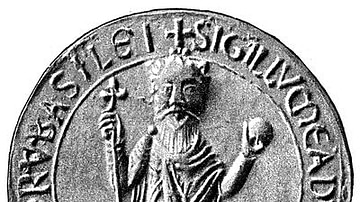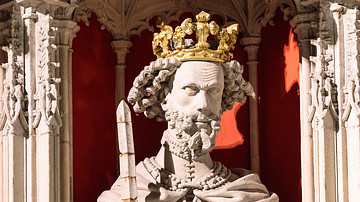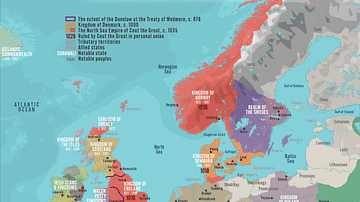Search
Search Results

Definition
Sword Beach
Sword Beach was the easternmost beach of the Allied D-Day Normandy landings of 6 June 1944. The 3rd British Infantry Division was given the task of taking the beach while paratroopers and Royal Marine and French Commando units secured the...

Definition
Odo of Bayeux
Odo of Bayeux (d. 1097 CE) was the bishop of Bayeux in Normandy and half-brother of William the Conqueror (r. 1066-1087 CE). After the Norman conquest of England in 1066 CE, Odo was given vast Anglo-Saxon estates and made, as the Earl of...

Definition
Edward the Confessor
Edward the Confessor, also known as Saint Edward the Confessor, reigned as king of England from 1042 to 1066 CE. Edward was reliant on the powerful Godwine (aka Godwin) family to keep his kingdom together but his achievements included a relatively...

Definition
William II of England
William II of England, sometimes called William 'Rufus' for his red hair and complexion, reigned as the king of England from 1087 to 1100 CE. The son of William the Conqueror (r. 1066-1087 CE), the younger William was loyal to his father...

Definition
Gisela of France
Gisela of France was a legendary 10th-century CE Francian princess, who, according to tradition, was married off to Viking leader Rollo of Normandy. Her name, Gisela or Gisla, comes from an Old German word meaning "to pledge", the French...

Definition
King Stephen of England
King Stephen of England, often called Stephen of Blois, ruled from 1135 to 1154 CE. His predecessor Henry I of England (r. 1100-1135 CE) had left no male heir and his nominated successor, his daughter Empress Matilda, was not to the liking...

Definition
Kingdom of West Francia
The Kingdom of West Francia (843-987 CE, also known as The Kingdom of the West Franks) was the region of Western Europe that formed the western part of the Carolingian Empire of Charlemagne (Holy Roman Emperor 800-814 CE) known as Francia...

Definition
Norman Conquest of England
The Norman Conquest of England (1066-71) was led by William the Conqueror who defeated King Harold II at the Battle of Hastings in 1066. The Anglo-Saxon elite lost power as William redistributed land to his fellow Normans. Crowned William...

Definition
Erwin Rommel
Erwin Rommel (1891-1944) was a German field marshal who gained fame as a tank commander in the Fall of France in 1940 and then as the commander of the Afrika Korps in North Africa, where he gained numerous victories. Known as the 'Desert...

Article
The Danish Conquest of England
The Danish conquest of England was not a singular event, but a series of large Viking invasions of England between 1013 and 1016, which eventually overthrew the native English dynasty. As a result, four kings from the House of Denmark ruled...